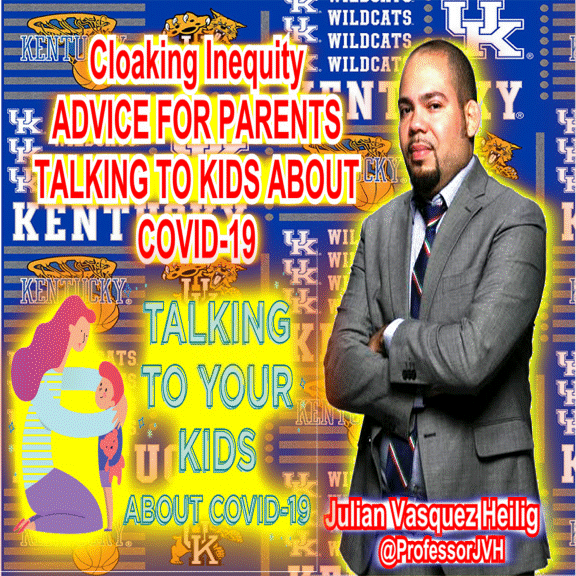ADVICE FOR PARENTS: TALKING TO KIDS ABOUT COVID-19
Below is a blog post from the University of Kentucky College of Education Department of Educational, School and Counseling Psychology’s Candace Hargons about best practices when talking to your kids about COVID-19.
In these unprecedented and trying times, most of us are having to manage our own fears and concerns about how we want to live through the COVID-19 pandemic. However, for those of us who are parents, we are also considering the experience we want to create for our kids and how we help them manage as well. As a licensed psychologist, a former high school teacher turned professor, as well as a married, working mom, I am sharing a few of the strategies I’ve learned based on psychological research and lived experience. Not everything works for everyone, but these can be used to get you started and help you continue to adapt.
1. Allow your children room to identify and express their feelings. In an effort to protect kids, some of us minimize the thoughts, emotions, and sensations they may be experiencing. We figure if we tell them not to be afraid, they will not feel it; however, telling kids not to be scared teaches them to hide fear, rather than to feel less fearful. Feelings give us good information about how a situation is being experienced, even though as the mantra goes “feelings aren’t facts.” Younger kids are more likely to have physical symptoms related to their emotions, rather than emotional language. So, invite your kids to tell you or show you how they feel. It doesn’t need to be a long conversation. You can simply ask: “How are you feeling today?” They can draw it, write it, or talk it out. After they answer, you can respond with gratitude and empathy with “Thank you for sharing that with me” or “That sounds tough. Would you like a hug?” You don’t have to fix it, because you may not be able to.
2. Maintain a similar rhythm in the ways you can. For example, wake time and/or bedtime can be maintained in most cases. If you were already doing a set family meal time, keep that up. This consistency facilitates mental health. Since so many things are changing at once, reducing the overall number of adjustments they have to make can reduce stress.
3. Incorporate time for play. In the rush to maintain academic rigor, your students may be receiving a lot of work. This is useful, but so is play time. Play is how younger kids learn. Social engagement is how adolescents learn. Family play time can be a new part of your week, if it isn’t already. Kid play time if you have multiples can be semi-structured (you set the play activity) or free play (you let them decide within a certain timeframe). Some artists are hosting online paint parties. Other parents are co-hosting digital play dates. For adolescents, support their need for communication and social engagement with peers (within a social distancing context) by allowing Facetime or Google Duo video interaction. Virtual dance parties are gaining popularity, so this may be an option for your teen’s school. Also, make sure there is regular physical activity, which can be incorporated with the play, for everyone.
4. Manage the media. Some news outlets are more sensational than others. Some outlets have more credible information than others. Media literacy is another teaching opportunity. If you don’t already watch, I’ve found Governor Beshear’s evening fireside chat and COVID-19 updates to be refreshingly balanced and informative. Make the decision for your family about what media you will and will not follow and how much media intake to allow. Also, when media sources engage in racial stereotyping discuss it.
5. Take care of you too. You are also adjusting, and it is okay to express when you need a little time or do not know the answer. If you are partnered, asking for a nap break (kids can wear you out no matter how much you love them) may be necessary. Being flexible with family roles and house chores/maintenance is also necessary. Avoid letting it all fall on one person, especially as many people are now balancing working from home.
I hope these tips are useful for you and your family. Below are additional resources for teachers and parents to use with kids:
The University of Kentucky is increasingly the first choice for students, faculty and staff to pursue their passions and their professional goals. In the last two years, Forbes has named UK among the best employers for diversity, and INSIGHT into Diversity recognized us as a Diversity Champion three years running. UK is ranked among the top 30 campuses in the nation for LGBTQ* inclusion and safety. UK has been judged a “Great College to Work for” two years in a row, and UK is among only 22 universities in the country on Forbes’ list of “America’s Best Employers.” We are ranked among the top 10 percent of public institutions for research expenditures — a tangible symbol of our breadth and depth as a university focused on discovery that changes lives and communities. And our patients know and appreciate the fact that UK HealthCare has been named the state’s top hospital for four straight years. Accolades and honors are great. But they are more important for what they represent: the idea that creating a community of belonging and commitment to excellence is how we honor our mission to be not simply the University of Kentucky, but the University for Kentucky.
This blog is crossposted from here.

